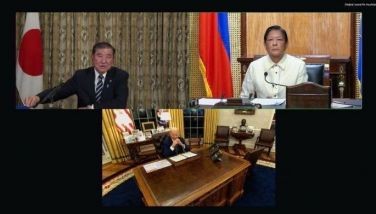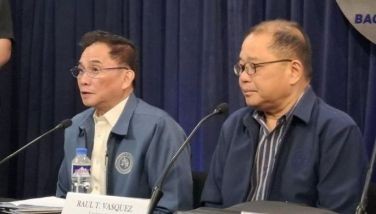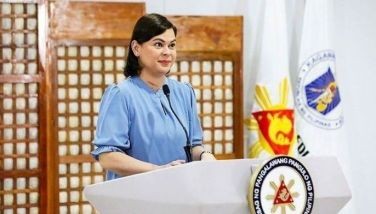Mayors to forge action plan vs poverty, terrorism
November 14, 2002 | 12:00am
Take the fight against poverty and terrorism to the grassroots.
This is the mission of the 1,495-strong League of Mayors of the Philippines (LMP) as they prepare to draft an action plan to be submitted to President Arroyo today.
LMP president Binalonan, Pangasinan Mayor Ramon Guico Jr. said yesterday the twin troubles of poverty and terrorism are at the top of their agenda for the 12th general assembly of municipal mayors being held at the Manila Hotel.
"Our main concern is how to deal with the problems of poverty and terrorism which are confronting local government units (LGUs) all over the country," Guico told The STAR.
He said town mayors conducted workshops during the three-day meet, which began Monday, to address the pressing problems facing their localities and identified the problems that must be elevated to the President for proper action.
Besides terrorism, local chief executives also discussed agricultural and agrarian concerns, local governance and capability-building programs for government officials.
The return of control over the supervision of local police to mayors was also among the topics discussed during the workshop series of the meeting. The LMP meeting was also attended by national government officials.
"We have not yet finalized our action plan, but the concerns of every municipality are being discussed and solutions are being proposed," Guico said.
He added that to curb the terrorism threat at the grassroots level, municipal governments must activate their respective peace and order councils (POCs) in each town. These councils are composed of various sectoral representatives, including police and military personnel assigned to the towns.
Guico said the POCs will draft each municipality’s integrated security plan.
The POCs will also recommend proposed ordinances to the municipal councils that will be implemented as part of each locality’s security measures.
Each town, Guico said, "has its own security features." He added that "coastal towns and hinterland municipalities have different security needs."
Once the draft proposal against terrorism and poverty is finalized, the plan will be voted upon by the LMP and submitted to the President for approval.
Earlier, Department of the Interior and Local Government (DILG) Secretary Jose Lina Jr. urged local chief executives to set up anti-terrorism panels in their respective localities to help the police and military identify suspected terrorists.
Lina also proposed the mobilization of barangay tanods (neighborhood watchmen) to combat terrorism and other forms of criminality.
The DILG chief also ordered town mayors to set up GMA Action Centers in their municipalities, which will serve as venues for complaints and sources of information for barangay residents.
In other developments at the LMP meet, the town mayors agreed to secure more access in the management of forest and marine resources, endorse the election of sectoral representatives in the 2004 elections, implement a "good governance measurement system" and adopt a municipal identification card (MIC) system for use in all transactions at the local level.
Guico said local chief executives are cognizant of the President’s pro-autonomy directives. He cited the President’s recall of three executive orders placing conditions on the release of the Internal Revenue Allotments (IRAs) of LGUs.
The municipal mayors also welcomed Malacañang’s proposed "One town, one product" economic strategy. They expressed readiness to provide the necessary local counterpart to set the new economic program in motion in preparation for the stiff competition they will face in the globalized trade arena of the free world market.
LMP secretary general and Ferrol, Romblon Mayor Pacifico Mayor said the mayors are seeking access to more foreign-funded projects under the Official Development Assistance program.
Mayor said fresh investments in the countryside will stimulate economic activities. These investments will also provide local employment and create new opportunities for the local market to increase operations as infrastructure support projects like farm-to-market roads, communal irrigation, potable water sources and micro-business ventures are introduced by municipal governments.
"This is an innovative scheme that will lead to more investments in the countryside," Mayor said. He added that the program is capable of attracting over P20 billion in infrastructure and economic investments into the towns.
In the face of a sharp decline in fish catch and the denudation of forests, the municipal mayors batted for the effective co-management of the country’s watersheds and the complete delineation of municipal waters so the country’s much-needed coastal resource management program can finally take effect.
The municipal chiefs have asked the Department of Environment and Natural Resources to define the mechanics of the co-management program with local officials. They also asked the DENR to identify protected marine areas and asked the National Food Authority to purchase the bountiful palay harvests of their farmers instead of resorting to rice importation.
This is the mission of the 1,495-strong League of Mayors of the Philippines (LMP) as they prepare to draft an action plan to be submitted to President Arroyo today.
LMP president Binalonan, Pangasinan Mayor Ramon Guico Jr. said yesterday the twin troubles of poverty and terrorism are at the top of their agenda for the 12th general assembly of municipal mayors being held at the Manila Hotel.
"Our main concern is how to deal with the problems of poverty and terrorism which are confronting local government units (LGUs) all over the country," Guico told The STAR.
He said town mayors conducted workshops during the three-day meet, which began Monday, to address the pressing problems facing their localities and identified the problems that must be elevated to the President for proper action.
Besides terrorism, local chief executives also discussed agricultural and agrarian concerns, local governance and capability-building programs for government officials.
The return of control over the supervision of local police to mayors was also among the topics discussed during the workshop series of the meeting. The LMP meeting was also attended by national government officials.
"We have not yet finalized our action plan, but the concerns of every municipality are being discussed and solutions are being proposed," Guico said.
He added that to curb the terrorism threat at the grassroots level, municipal governments must activate their respective peace and order councils (POCs) in each town. These councils are composed of various sectoral representatives, including police and military personnel assigned to the towns.
Guico said the POCs will draft each municipality’s integrated security plan.
The POCs will also recommend proposed ordinances to the municipal councils that will be implemented as part of each locality’s security measures.
Each town, Guico said, "has its own security features." He added that "coastal towns and hinterland municipalities have different security needs."
Once the draft proposal against terrorism and poverty is finalized, the plan will be voted upon by the LMP and submitted to the President for approval.
Earlier, Department of the Interior and Local Government (DILG) Secretary Jose Lina Jr. urged local chief executives to set up anti-terrorism panels in their respective localities to help the police and military identify suspected terrorists.
Lina also proposed the mobilization of barangay tanods (neighborhood watchmen) to combat terrorism and other forms of criminality.
The DILG chief also ordered town mayors to set up GMA Action Centers in their municipalities, which will serve as venues for complaints and sources of information for barangay residents.
In other developments at the LMP meet, the town mayors agreed to secure more access in the management of forest and marine resources, endorse the election of sectoral representatives in the 2004 elections, implement a "good governance measurement system" and adopt a municipal identification card (MIC) system for use in all transactions at the local level.
Guico said local chief executives are cognizant of the President’s pro-autonomy directives. He cited the President’s recall of three executive orders placing conditions on the release of the Internal Revenue Allotments (IRAs) of LGUs.
The municipal mayors also welcomed Malacañang’s proposed "One town, one product" economic strategy. They expressed readiness to provide the necessary local counterpart to set the new economic program in motion in preparation for the stiff competition they will face in the globalized trade arena of the free world market.
LMP secretary general and Ferrol, Romblon Mayor Pacifico Mayor said the mayors are seeking access to more foreign-funded projects under the Official Development Assistance program.
Mayor said fresh investments in the countryside will stimulate economic activities. These investments will also provide local employment and create new opportunities for the local market to increase operations as infrastructure support projects like farm-to-market roads, communal irrigation, potable water sources and micro-business ventures are introduced by municipal governments.
"This is an innovative scheme that will lead to more investments in the countryside," Mayor said. He added that the program is capable of attracting over P20 billion in infrastructure and economic investments into the towns.
In the face of a sharp decline in fish catch and the denudation of forests, the municipal mayors batted for the effective co-management of the country’s watersheds and the complete delineation of municipal waters so the country’s much-needed coastal resource management program can finally take effect.
The municipal chiefs have asked the Department of Environment and Natural Resources to define the mechanics of the co-management program with local officials. They also asked the DENR to identify protected marine areas and asked the National Food Authority to purchase the bountiful palay harvests of their farmers instead of resorting to rice importation.
BrandSpace Articles
<
>
- Latest
- Trending
Trending
Latest
Trending
Latest
Recommended


































